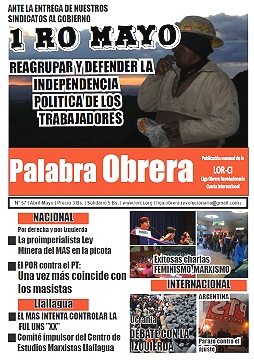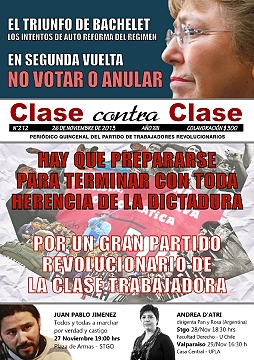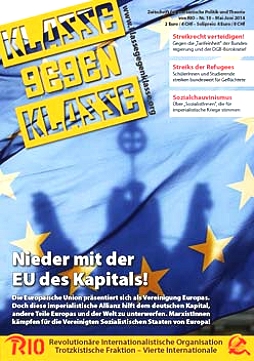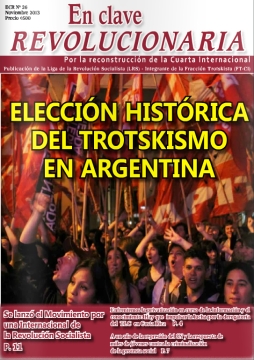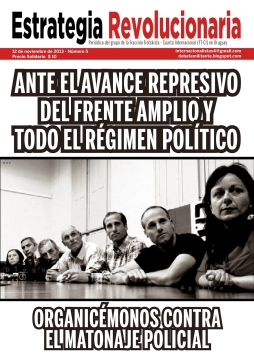Argentina
The elections opened up a national political crisis
12/07/2009 LVO 332
The June 28th mid-term election results opened up a real national political crisis. The “governability,” which in view of the international capitalist crisis was the pretext for moving the elections forward and its transformation into a General Referendum, has resulted in a crisis. The current administration and the Peronists were defeated on their own turf; in the province of Buenos Aires, where they [the PJ] had decided to run a “local” candidate and “the best man for the job,” they chose governor Scioli to accompany [president] Kirchner. Putting all their eggs in one basket, they were left with nothing: the current administration tried to evade the situation by throwing out dead weight like the Ministry of Transport, Jaime, announcing his resignation, but it’s too late. They are left weak in the most important province in the country. The main party, the PJ, is lead by the losers of the election, including Moyano leader of the CGT.
The frequently mentioned “reorganization of Peronism,” thus becomes even more difficult because of the disavowal of its current leadership. Reutemann, the winner in his province, who could be the one to realign all of the fractions leading to the presidential election, had recently failed to recognize Scioli as the leader of PJ while De Narváez welcomes the Menemists like Romero. Narvaez at the same time holds an alliance with Macri who is leaning towards a political project outside of the Peronism party. In the Pan-Radicalism party, Cobos has positioned himself to run for president, outshining Carrió, but their political force, Acuerdo Cívico, as a whole has not yet emerged as an stable alternative for the bourgeoisie, neither could overcome the traditional bloc of anti-Peronism votes. The agricultural bloc won seats presenting candidates in various lists, but not a party that could be an alternative power. The “governability crisis” is not only a result of the defeat of the government, but also the lack of an opposition bosses’ party that could replace the end of the Kirchnerist cycle. We are facing new evidence of a crisis in the regimen of fragmented political parties.
Within the strategic crisis of the dominating class we must keep in mind that the election expressed, through a combination of events, a turn to the right by a wide sector of the middle class, a tendency that has been seen since beginning of the conflict with the agricultural sector. The owners of corporations see the electoral victories of De Narváez; Reutemann in Santa Fé province and Cobos in Mendoza province, all of them representatives of the agricultural interest, as a sign. The owners of the corporations are trying to achieve the unity that this sector could not get through a political party. The UIA (Argentinean Industrial Association) was the vanguard in proposing to unite the Agricultural Liaison Committee (negotiating body of the agro sector) in order to impose conditions. “In no time the rest of the G-7 will join, including the Stock Market, the banks, the builders, business and the countryside. The objective is ‘to open new dialogues to implement a series of demands that have been dragged out since before the elections: postponing salary negotiations due to the crisis, lowering of taxes and withholdings, preventing State intervention in the economy and reopening negotiations with the Paris Club and the and the share holders who rejected the exchange of bonds in 2005” (Crítica 7/1/09). The corporate business owner’s front is trying, for now, to use the worn down Kirchner administration to impose their demands, while trying to not let the blood reach the river of destabilization. This pressure will include necessary attacks on the workers in order to modify the power relations.
The Election Results and the Working Class
The majority of the large concentration of working class in the Buenos Aires province has expressed support for the current administration with a conservative vote, especially in the unionized sectors, who support the CGT, which was flooded with the propaganda of “maintaining what has been gained.” The election results open up a crisis in light of the shortcoming of the supposed “protectors”. A sector of the working class “no Peronists” from the Capital, mostly teachers, government and service workers, made up part of the support received by Pino Solanos; this was an expression of the discourse against the rightwing Marcrist government as well as the intention to break from the left’ with Kirchnerism. Both those who have hopes in this new variant as well as the industry workers who suspect the that victory of De Narváez’s and the neo-Menenist alliance will make the industry owners even bolder, are planning to confront the convulsive events that will occur during the current, national, political crisis.
The working class’ force is intact and they will put forth strong struggles of resistance, they will go further than the level of consciousness held by the different sectors entering into the struggle, and awaken their political life. The international capitalist crisis will demonstrate the intolerant, business, owner class, who are looking to use all of their resources against the workers. Julián A. Diego, the boss’ lawyer and defender of the old ex-owners of Zanon, has proposed that the enemy will seek revenge: “a certain state of rebellion has grown in the labor world, which doesn’t have a clear structure and much less, controlled by the union and its leaders (…) the state of assembly has created leaders and great resources in many companies, over the questioning of the representation and the different stratums of the union structure”. (El Cronista,6/29/09).
We have the utmost confidence that through this process the political experience will mature with Peronism as well as the expectations for the central-leftwing; these will be a fleeting trend because you can’t stop the right with discourse. The leaders of the CGT who participated in the leadership in the PJ and plan to make a “social pact” with company owners, don’t think twice about sending hired thugs to go after the workers who organize against the layoffs. The leaders of the CGT who supported Pino Solanas project had no problem aliening themselves with the agricultural industry owners in midst of the bosses lockout, which gave a foundation to the current swing to the right. Victor De Gennaro, a CTA representative, had pronounced that there should be a political movement built that represents the thousands that are in the streets.
In order to defend ourselves from the bosses attacks against the rights that have been gained, and not allowing the resolution for the national, political crisis derive from the rightwing, company, owner’s bloc that recently won the elections, it’s necessary to win the most intransigent working class political independence. The campaign that we made with the Left Front during the elections has no future unless we continue to fight in the organizations of struggle, the unions, and in the workplace to build powerful working class party.
Make me Work and I’ll Make you Sick
While the sanitation experts and the very own Health Minister, Ocaña, had advised that the elections be suspend on account of the H1A1 virus (the Buenos Aires province has the highest concentration of flu cases) the government and the justice department decided to go ahead with the “the mother of all battles” with and unlawful attitude”. Instead of informing people of the necessary means of prevention and of the seriousness of this pandemic, the State “information” apparatus and the media serve the propaganda of one or the other capitalist bands, in other words their own reproduction at the cost of public health.
Days after the elections, the front page of De Narváez’s newspaper, El Cronista, read “the H1A1 pandemic threatens to paralyze the economy,” and adds that: “For every day without activity, the country can loose up to u 500 million, equivalent to %50 of the daily GNP.”(7/1). ‘Make me work and I’ll make you sick’ can sum up the morning paper of the Union Pro Depute. The new Health Minister, Juan Manzur, declared that “There are simple and concrete measures that must be taken from certain hygiene measures, to security and strictly technical and sanitary criterions.” Not one word about giving time off for the millions that travel to work everyday using public transportation, one of the principle places of contagion, announced by the Body of Subway Delegates.








